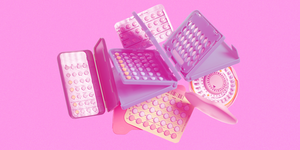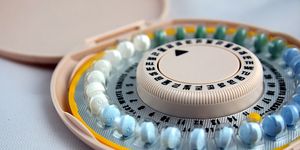
Preventing pregnancy isn’t the only reason you might be on the pill—but it’s a biggie. And when you’re on it, you kind of expect not to get pregnant.
But uh, just in case you weren’t aware: Oral contraceptives aren’t 100 percent effective against pregnancy. In fact, about five to nine out of 100 women will get pregnant on the Pill, according to the U.S. Department of Health and Human Services.
Kind of a kick to the gut, huh? Don’t start freaking out just yet—while, yes, you can still get pregnant when you’re on the Pill, it’s still pretty unlikely; here’s what you need to know, just in case.
I’m confused: How can you get pregnant on the Pill?
It all comes down to how stringent you are about taking the Pill—”perfect use” versus “typical use.”
Perfect use, for example, is taking the Pill every day at roughly same time, without fail. That’s obviously your best bet for staying pregnancy-free—when it’s used perfectly, the Pill is 99 percent effective, according to Planned Parenthood.
“If you take it every single day faithfully, you should be fine,” says Mary Jane Minkin, M.D., clinical professor of obstetrics, gynecology and reproductive sciences at Yale School of Medicine. “But the problem is, we’re human, and people skip pills occasionally.”



That’s where typical use comes into play. Let’s say you miss a dose or two once a month, or you take it later than usual (by just three hours, for some types)—that can lessen the Pill’s effectiveness, dropping it down to being only 91 percent effective, per Planned Parenthood. Yikes.
The type of medication you take matters, too: Combination pills—ones that contain both estrogen and progestin—are a bit more effective than progestin-only pills (a.k.a., mini pills), which are pretty time-sensitive.
That’s because progestin-only pills work by thickening cervical mucus and thinning the lining of the uterus, according to the HHS. This blocks sperm from getting to your egg—but the cervical mucus can begin to thin back out even after one missed dose (that’s why the HHS recommends using a back-up BC method like condoms if you miss a dose even by three hours).
Combination pills, on the other hand—which again, have both estrogen and progestin—stop your ovaries from releasing eggs, in addition to the cervical mucus getting thick, and the uterine lining thin. That’s why you typically have a week of inactive pills—combination pills have a bit more staying power.
The way you handle missed pills is different for each type, too: If you forget to take a combination pill, take it as soon as you remember (or, if you’re closer to your next dose, take two pills). For progestin-only pills, if you miss one, take it as soon as you remember; but don’t take two at the same time. Instead, start taking pills again as you regularly would, and use another form of birth control for two days until you’re protected again.
Certain medications can also make your pill less effective, like antibiotics, antifungals, and anti-seizure medicines, per Planned Parenthood. If you start taking any of those, check in with your doctor to make sure your birth control isn’t at risk.
So, how can I make sure birth control is as effective a possible?
Again, take it every day, at the same time.
An easy way to do this is to make it part of your daily routine, says Minkin, who suggests doing it after eating breakfast—an ideal time to take any medicine.
If you flat-out suck at remembering to do things daily, you might want to consider a different kind of contraceptive, says Minkin.
The Nuva Ring and the patch both work similarly to the Pill—you can change those things out every week or month, depending on what you use—but you don’t have to remember to take anything on the daily. Better yet: Opt for a long-acting birth control, like the IUD, which can last up to 12 years, depending on the kind you get.
Okay, but what happens if I do get pregnant on the Pill?
Stop taking it immediately, says Minkin. While everyone’s risk of birth defects (even those who weren’t on the pill) is about three percent, there could be a higher risk from using contraceptives during pregnancy, she says.
“We can never really say if [a birth defect] is due to the pill or something else,” says Minkin. “There’s a very small risk, but it’s not zero.”
After that, definitely check in with your doctor to figure out next steps, depending on your personal choices.
Source: Read Full Article